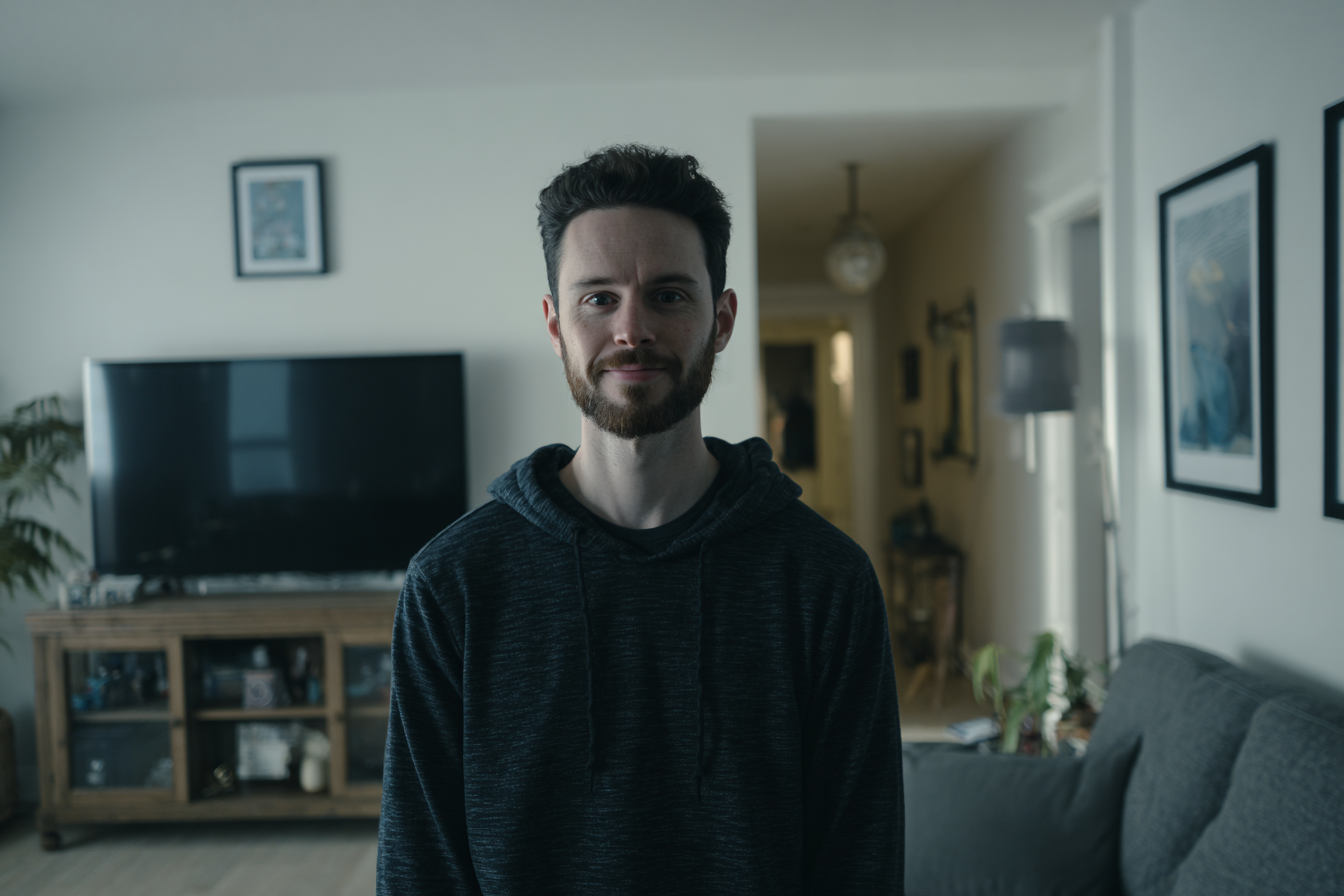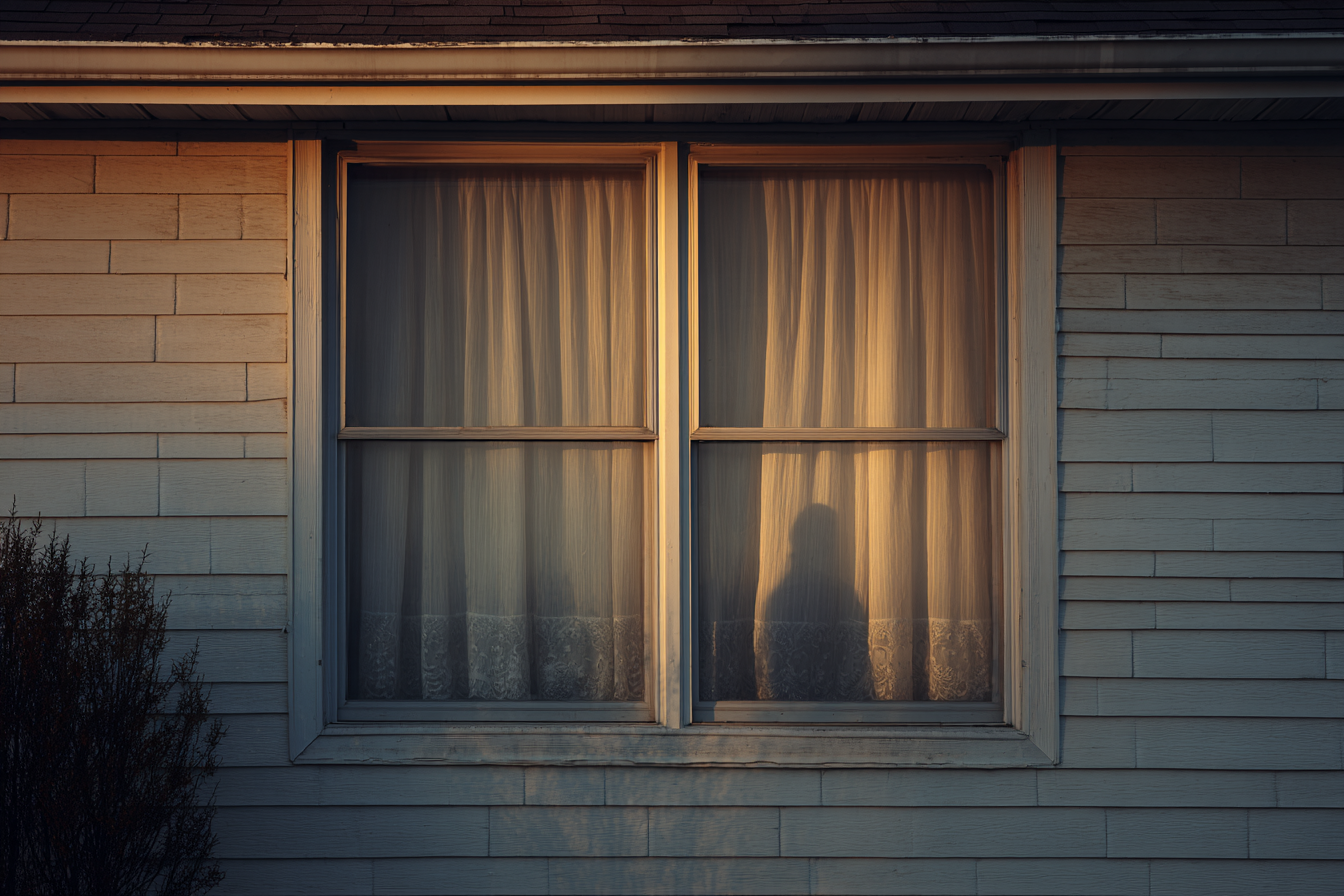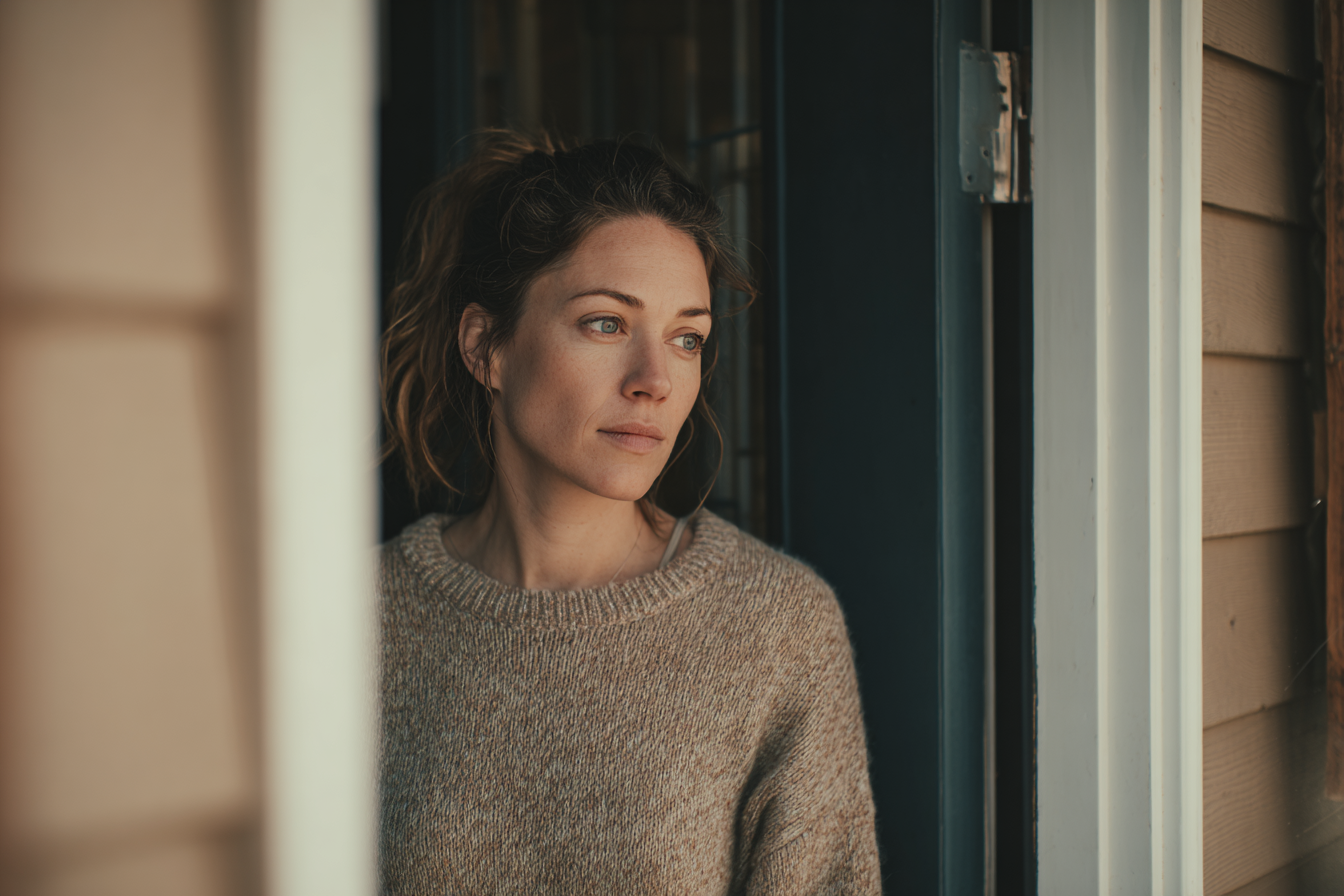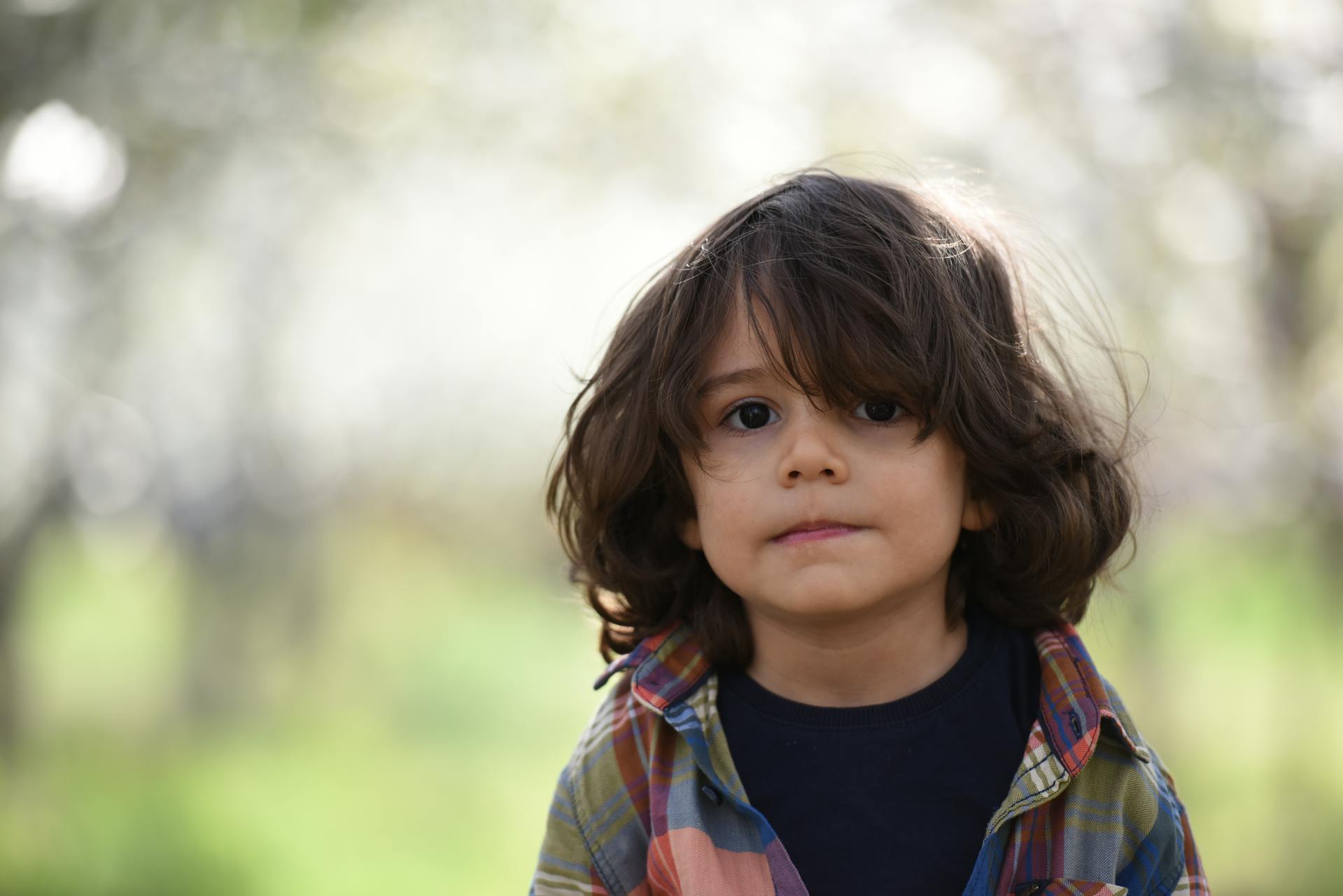The air in this house always felt thick, not with dust, but with history. I inherited it from my grandmother, a sprawling, slightly creaky old place that had been in our family for generations. I loved it. It was my sanctuary, a place where time seemed to slow, where the ghosts of laughter and whispered secrets felt comforting rather than chilling.
Then the new neighbor moved in next door.She was an older woman, perhaps in her late sixties or early seventies, with bright, inquisitive eyes that seemed to take in everything. She was friendly, almost overly so, always ready with a smile and a wave over the fence. At first, I found her charming. A little eccentric, maybe, but harmless.
But then her questions started.”Such a beautiful old place,” she’d say, peering over. “Do you know much about its history?” Or, “I’ve always wondered about the foundations of these houses. Are they strong?” Harmless enough, at first. But her focus began to narrow.

A man standing in a living room | Source: Midjourney
“Does your house have a cellar, dear? Or a basement?” she asked one sunny afternoon, her gaze not on me, but on the ground beneath my feet, where my house’s foundation met the earth.
I shrugged. “Just a basement, really. Laundry, storage, you know. Nothing exciting.” It’s dark. It’s damp. It smells like old earth and forgotten things. Definitely not exciting.
She smiled then, a tight, knowing smile that didn’t quite reach her eyes. “Ah, the basement. They can be full of surprises, those old basements.”
That was the first time I felt a prickle of unease. Why was she so interested in my basement? It wasn’t exactly a feature I boasted about. Over the next few weeks, her casual inquiries grew more specific, more frequent. “Has your basement ever flooded?” “Did they ever do any renovations down there?” “Is there a separate entrance, perhaps, around the back?” She asked these things with an intensity that went beyond simple neighborly curiosity. It felt… purposeful.

A silhouette in a window | Source: Midjourney
I started to feel watched. Every time I stepped outside, her curtains would twitch. Every time I worked in the garden, she’d be there, ostensibly tending to her own prize roses, but her head always tilted slightly in my direction, listening. Is she trying to scope out my house? Is she a professional thief? That seems unlikely, given her age. My imagination, fueled by true crime podcasts, began to run wild.
I started avoiding her. I’d pretend I hadn’t heard her calling my name, or quickly duck inside if I saw her coming. But her words, particularly about the basement, had lodged themselves deep in my mind. “They can be full of surprises.” The phrase echoed, dark and unsettling. I’d lived in that house my entire life, but now, her relentless focus made me question everything I thought I knew about it.

A window | Source: Midjourney
I hated going down to the basement. It was a utilitarian space, filled with inherited junk, boxes of forgotten memories, and the washing machine. The light was dim, even with the single bare bulb hanging precariously from the ceiling. Cobwebs draped like forgotten lace, and the faint, earthy smell always made me feel claustrophobic. But I couldn’t ignore it anymore. Her persistent questions had planted a seed of dread.
One Tuesday, when I knew she’d be out for her bridge club, I took a deep breath, grabbed a flashlight, and descended the rickety wooden stairs. The air immediately felt heavier, cooler. Just old house stuff, I told myself, trying to calm my racing heart.
I started in the main area, near the laundry. Nothing. Just overflowing shelves of old paint cans and rusted tools. Then I moved to the back, to a small, enclosed space that my grandmother had always called the ‘storage room’. It was hardly a room, more of a glorified closet carved out of the foundation. I rarely went in there. It was full of even older, dustier boxes.

A close-up shot of a woman’s eyes | Source: Midjourney
I scanned the walls, tapping them lightly, listening for a hollow sound. Most were solid, rough-hewn stone or thick concrete. But then, in one corner, behind a stack of faded photo albums, I noticed something odd. A section of the wall, about three feet by two, was different. It wasn’t stone or concrete. It was wood, painted over to blend in, but the texture was slightly off. And the paint was flaking in a way the rest of the wall wasn’t. It looked like it had been there for decades, hidden in plain sight.
My heart began to THUMP. This was it. This had to be what she was looking for.
My fingers trembled as I ran them over the faint outline of what looked like a seam. I pushed. Nothing. I tried again, pressing harder. Still nothing. I pulled. I nudged. Finally, frustrated, I wedged my fingers into a tiny crack where the ‘patch’ met the stone, and pulled with all my might.
There was a groan of old wood, a shower of dust, and then, slowly, a section of the wall swung inward, revealing… a dark, narrow passage. Not a room. A passage. It led into absolute blackness.

A woman standing in the doorway of her house | Source: Midjourney
My breath caught in my throat. I clicked on my flashlight, its beam piercing the inky void. The passage was short, leading to an even smaller, hidden alcove. And inside that alcove, meticulously arranged on a dusty, makeshift shelf, were things that made my blood run cold.
There was a tiny, faded wool blanket, folded precisely. A pair of miniature, yellowed booties. A small, wooden rattle. And sitting proudly in the center, a worn, threadbare teddy bear, its single button eye staring blankly into the light.
My mind reeled. What is this? It was clearly baby items. Hidden. In my basement. I felt a wave of nausea. Had someone given birth down here? Had a child died? The sheer, suffocating sadness of it was palpable, like the very air was weeping.
Then, beneath the teddy bear, I saw it. A small, leather-bound journal, its pages brittle with age. I carefully picked it up, my hands shaking so violently I almost dropped it. The cover was blank, but inside, the handwriting was delicate, spidery, and heartbreakingly familiar. It was my grandmother’s hand.
The first entry was dated over seventy years ago.

A close-up shot of a woman’s face | Source: Midjourney
“November 12th. The shame. The absolute, crushing shame. How could I be so foolish? Mother will kill me. No one can ever know.”
I devoured the words, each one a sharp blade to my heart. My grandmother, so proper, so outwardly serene, had a secret. A huge, devastating secret. The journal documented a hidden pregnancy, a desperate attempt to keep it from her strict family, the terror of giving birth alone in the very house I now stood in. She’d given birth in secret, in the dead of winter, right here in the basement.
The entries became more frantic after the birth. The anguish, the impossible choice. She couldn’t keep the baby. She couldn’t. Not with her family, not in that era. Her child, a daughter, would be taken away, adopted in secret, far from here, with no one ever knowing. The entries were a raw, agonizing testament to a mother’s love and her forced sacrifice. She never saw her baby again after that day, but she kept these few precious items, a silent shrine to the daughter she couldn’t claim.
My vision blurred. My grandmother. A secret child. Adopted. A daughter who was still out there, somewhere.

A little boy | Source: Pexels
I stumbled out of the alcove, the journal clutched to my chest, my mind spinning. The weight of generations of secrets suddenly pressed down on me. I looked at the little hidden cavity, at the tiny items, then up the stairs to my normal, everyday house. Nothing felt normal anymore.
Just as I reached the top step, the front door rattled. I heard a familiar voice calling, “Hello, dear? I saw your lights on. I brought over some of my homemade apple pie.”
My blood ran cold. It was the neighbor.
I opened the door, forcing a weak smile. She stood there, holding a pie, her bright eyes fixed on me. But this time, they weren’t just curious. They were… searching. And something in their depths was achingly familiar.
“You look a little pale,” she said, her voice soft. “Is everything alright?”

A girl smiling | Source: Pexels
I stared at her, at the lines around her eyes, at the way she held her hands, slightly clasped, as if holding onto something precious. It can’t be. My mind screamed. It’s impossible. But the pieces clicked into place with a horrifying, sickening finality. Her intense interest in the house, the basement, the foundations. Her piercing gaze.
“I think I found something,” I whispered, my voice barely a thread.
She lowered the pie, her gaze locking onto mine. And then, her eyes, those same searching eyes that had watched me for weeks, filled with tears.
“I know,” she said, her voice raspy with emotion. “I knew she’d hidden something here. I just… I had to be close. I had to know if there was any trace.”
My jaw dropped. She wasn’t looking for a treasure. She wasn’t a thief. She wasn’t a curious busybody.
She was looking for proof. Proof of her own existence.
“My birth mother,” she choked out, a single tear tracing a path down her wrinkled cheek, “lived in this house. She gave me up for adoption. I’ve been searching my whole life.”

A child holding a paintbrush | Source: Pexels
I looked down at the journal in my hands, at my grandmother’s looping script, at the mention of her lost daughter. I looked back at the neighbor, at the overwhelming grief and hope radiating from her.
The neighbor wasn’t interested in my basement. She was looking for a connection to the mother she never knew. She was looking for her own beginning – hidden for seventy years, beneath my floorboards. And my grandmother, the quiet, dignified woman I knew, had been living with this unbearable secret her entire life. My new neighbor… was my mother’s sister. My aunt. The daughter my grandmother was forced to abandon.
My world didn’t just shatter; it imploded. Everything I thought I knew about my family, about my quiet, predictable life, was a lie. And now, I stood holding the evidence of a lifetime of hidden pain, faced with a woman who was a stranger, yet suddenly, undeniably, family. And she was standing right on the doorstep, waiting for me to tell her the truth I had only just uncovered. The truth that had been buried in my basement, along with my grandmother’s heart.
The raw shock of it left me breathless.
And the apple pie, still warm in her hands, felt like a cruel irony, a symbol of domestic normalcy shattered by a lifetime of hidden grief.
What do I do now?